BANK OF ALBANIA
PRESS RELEASE
Governor Sejko: Statement to the Press Conference on Monetary Policy Decision, 20 December 2023
Publication date: 20.12.2023
Dear ladies and gentlemen,
Today, on 20 December 2023, the Supervisory Council of the Bank of Albania reviewed and approved the Intermediate Monetary Policy Report.
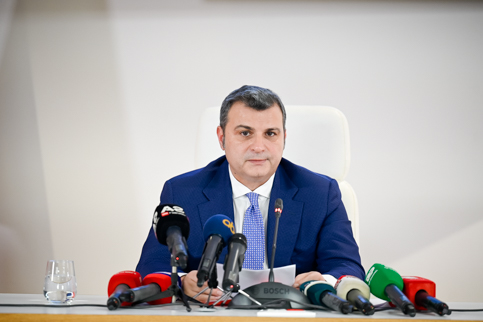
The new information analysed in this Report has resulted, overall, in line with our expectations. Economic activity has continued to grow in the second half of 2023, while inflation has been declining in the fourth quarter. The normalisation of monetary policy stance has helped in mitigating the domestic inflationary pressures and the smooth functioning of money markets.
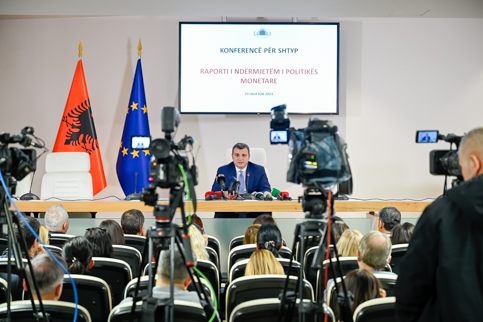
Projections on the future remain positive: the volume of economic activity is expected to grow in the medium-term horizon, while inflation is expected to gradually return to the target during the next year.
The Supervisory Council deemed that the trajectory of monetary conditions remains in line with inflation coming bank to the target within the time horizon of some quarters. In light of the above, the Supervisory Council decided to maintain the monetary policy stance unchanged.
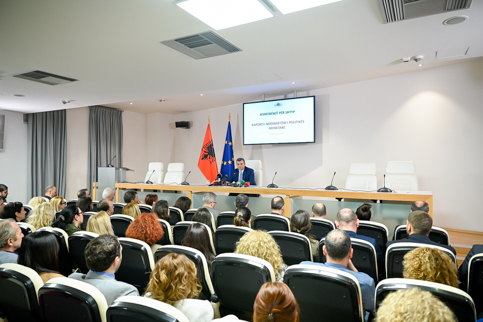
[Below, I will outline today's decision and explain in more detail the rationale behind it.]
***
Inflation of consumer prices dropped to around 3.9% in the first two months of the fourth quarter. Inflation fell on the back of the lower inflation in food items, services and durable consumer goods. On the other hand, housing and non-food consumer goods, particularly fuels, recorded high inflation rates.
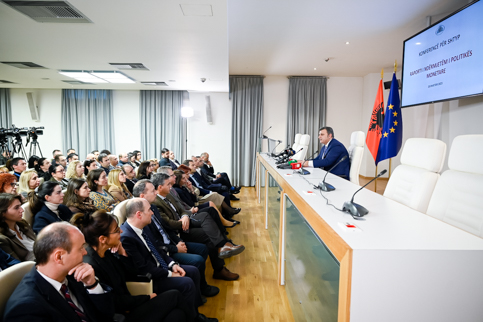
From the macroeconomic perspective, the fall in inflation reflected the reduced domestic inflationary pressures. However, these pressures remain relatively elevated and - despite decelerating - are not yet in line with our inflation target. The high and stable demand for goods and services - which has led to a fast increase in wages and production costs, in turn keeping profit margins high - has driven inflation pressures edging up. On the other hand, imported inflation has been relatively low and stable. The fast reduction of these pressures during 2023 has reflected both the performance of prices in international markets and the appreciation of the lek exchange rate against the euro.
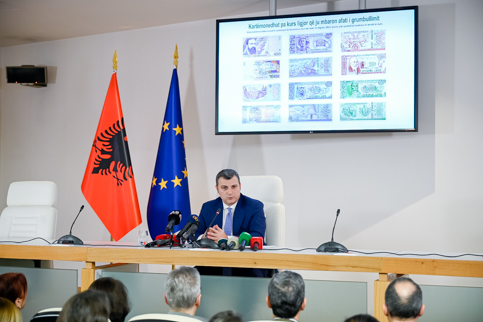
The available information, despite incomplete, suggests a good performance of economic activity in the second half of year. The volume of economic activity, employment and wages have been growing, mainly reflecting the positive trend in services sector guided by tourism. Revenues in this sector amounted to EUR 3.2 billion in the first three quarters of year, upward by 47% from the same period in the previous year. Albania, for the first time in our history, as an economy based on the free market principles, recorded a positive balance in both trade account and current account, estimated at around 6.4% of GDP in the third quarter.
From the demand perspective, the growth in family consumption, investments and in the export of services mainly drove economic activity expanding. Meanwhile, fiscal policy continued to have a consolidating stance.
Expanding demand for goods and services has pushed the economy into a positive phase of the business cycle. This performance is reflected in the continuation of the rising trend in employment and wages and in the further decline of unemployment rate. In more concrete terms, in the third quarter, employment recorded an annual growth of 1.2%, wages in private sector increased by 14.5%, while the unemployment rate dropped to a historic minimum of 10.5%. The raise of employment and wages has continued to fuel the growth of consumption in the economy, but the shortages present in the labour market and the fast expansion of wages still keep internal inflationary pressures high.
The pass-through of monetary policy stance normalisation to financial markets has driven to an overall increase of interest rates on deposits, loans and government’s securities. The overall monetary and financial conditions, though trending up, still remain simulating for the economic growth. In response to them, credit to the private sector accelerated its growth pace in the fourth quarter, recording 8% in November. The increase in credit has been supported by the rapid expansion of credit in lek. The latter has financed the growth in consumption and private investments. In parallel, liquidity and capitalization indicators of the banking sector appear at good levels, the quality of credit portfolio remains sound, while the banking sector continues to exhibit a positive approach towards lending.
Lek exchange rate against the euro showed a clear appreciating trend over the course of 2023. This performance has reflected the pronounced improvement in the international trade balance, which has generated foreign currency surplus in the domestic market. This improvement was even faster in the third quarter, as a result of a 34% growth in total exports, a 14% increase in remittances and a 10% increase in foreign direct investments, resulting in a significant positive surplus of the current balance and the overall balance of payments.
The appreciation of the exchange rate has provided a significant contribution to both: the mitigation of foreign inflationary pressures in 2022 and the downward trend of this indicator during 2023.
The updated of projections reaffirms our previous expectations. The Albanian economy will continue to grow, fuelled by the further expansion in consumption, investment and export of services. The economic growth pace is expected to slow slightly in 2024 and return to its potential in the next years. On the other hand, inflation is expected to continue to decline gradually over the course of next year and return to the target, in the second half of next year. This decline will reflect both a better demand and supply equilibrium in the domestic economy, and a further reduction of inflation in our trading partners.
***
Judging on the above, the Supervisory Council decided to:
- Keep the policy rate unchanged, at 3.25%;
- Keep the overnight lending rate unchanged, at 4.25%
- Keep the overnight deposit rate unchanged, at 2.25%.
The Supervisory Council notes that this decision is consistent with our expectations in the baseline scenario.
However, the Supervisory Council deems that the elevated inflationary pressures from the domestic economy remain a risk factor for price stability in Albania. In this view, it highlights the willingness to continue the normalisation process of monetary policy stance, if this measure will be considered necessary to guaranteeing price stability. In any case, the next monetary policy decisions will be based on the new information, and consistent with fiscal policy stance and exchange rate performance.
***
Dear ladies and gentlemen,
At the end of this communication, which is the last one for 2023, I would like to - in line with the tradition - present a brief overview of the work of the Bank of Albania during the past year and its results.
At the beginning, let me reiterate that – despite the challenges we dealt with – the year 2023 was a positive year for our economy. The Bank of Albania has provided a considerable contribution in this regard. In line with our legal objectives, we have continued to work for: safeguarding the monetary and financial stability of Albania; the development of financial markets and payment instruments; the financial education of the public; as well as for the management of cash in circulation and the international reserve of the country, etc.
All this activity has taken place pursuant to our legal mandate, our medium-term development strategy, as well as with other institutional commitments. At the political level, the Supervisory Council of the Bank of Albania has led and continuously monitored the activity of the Bank of Albania, while the dedicated staff of the Bank of Albania has implemented this activity at operational level.
Following, I will list some of main aspects in our work.
First, we have continued the normalisation drive of monetary policy stance during 2023, raising the policy rate to 3.25% at the end of 2023, from the historical 2.75% at its beginning. This action of our monetary policy was in harmony with that implemented by all other central banks and remains anchored in three important principles. First, this normalisation aims at inflation returning to the target in a timely manner and at the lowest costs possible for the Albanian economy. Second, this normalisation has been constantly coordinated with the fiscal policy and the progress of the relevant factors that affect inflation, where the exchange rate dynamics stand out. Third, the normalisation of monetary policy stance has been and remains a new-information dependent process. Although we have continuously provided the economy and financial markets with forward guidance on monetary policy, these orientations have neither conditioned and nor will condition our decisions in real time.
Second, our work is focused on preserving a sound, flexible and efficient financial system, through improving and completing our legal and regulatory framework, aligning it with the EU acquis, through maintaining prudent supervision practices of banking activity, coupled with an intensive cooperation with homologue authorities. This year, the decision to remove Albania from the list of jurisdictions under increased monitoring (grey list) was approved, creating the possibility of further equivalence of the legal and regulatory framework of banking supervision with that of the European Banking Authority. In parallel with the above, the Bank of Albania has supported the banking sector in drafting appropriate policies for the financing of the capital increase requirement (MREL). As a whole, the banking sector has maintained satisfactory parameters to meet this requirement.
In reflection of the economic developments, solid business management practices as well as our supervisory and regulatory work, Albanian banks have satisfactory reserves of capital, liquidity and low non-performing loans ratios. The latter continues to remain at historically low levels, of around 5% as at November 2023. In addition, our stress test results show that the banking system is, overall, resilient to shocks even in adverse scenario, and able to support the economy.
Third, the Bank of Albania has paid special attention to cyber security, undertaking a series of initiatives in order to strengthen the level of security of the infrastructure and IT systems, perfecting business continuity plans as well as increasing the level of awareness and response to cyber threats. In this context, through collaboration with national and international authorities, we have coordinated the work to enhance communication with the banking industry regarding the real-time distribution amid banks of Compromising Indicators and threats from different actors. This has served for a symmetrical distribution of information and a more unique approach in terms of the banks' measures and response.
Fourth, we have provided contemporary and efficient systems for the conduction of payments and we have met the economy demand for cash, by strengthening confidence in our monetary and financial system. The year 2023 coincides with the finalization of the National Retail Payments Strategy (2018-2023). In this context, achievements have been noted in terms of the implementation of the last remaining measures in the action plan, which are related to the approval and implementation of the law "On the payment account with basic features". This law is already a reality and is expected to affect the further expansion of financial inclusion and the use of electronic payments. In this framework, the financial inclusion of most of citizens has increased at a satisfactory pace, reaching almost 70% and the payments per capita of most of population resulted in 20 for 2023 from 17 a year ago.
The measures taken within the modernization of payment systems have had a real impact on the economy. Thus, based on available statistics, euro-denominated interbank transactions for customers within Albania have increased by around 42% in the first 11 months of 2023 and, according to approximated estimates, have saved the Albanian economy at least around EUR 22 million. On the other hand, the work initiated by the Bank of Albania for accelerated membership in SEPA (Single Euro Payment Area), in the framework of the regional project "For the modernization of payment systems in the countries of the Western Balkans" and further promoted in the new Growth Plan of the Western Balkans, is estimated to bring a series of benefits for a range of strategic sectors of the Albanian economy, such as exports, tourism, foreign investments. In addition, work was also done, throughout this year, in the framework of other infrastructural developments, such as the updating of payment systems and the possibility of creating an "instant payment" system.
Fifth, we have continued the work for the efficient management of the Albania's international reserve, by observing the best criteria in the field of liquidity and security. Year 2023 marked one of the years with the highest return from foreign reserve management. In parallel with it, the Bank of Albania has taken concrete steps in order to - in the shortest possible time and in cooperation with our internal and external partners - further develop monetary and financial markets in Albania.
Sixth, the Bank of Albania has actively contributed in the European integration process, in addition to enhancing the dialogue with the Albanian and international partners. The Bank of Albania has played a key role in the "screening" process of the implemented legislation, its alignment with the EU acquis, and in identifying the further needs for starting the negotiation process of Albania's membership in the EU. For this major aspiration and historical process, we will continue to contribute responsibly and intensively in the future as well.
The latest Progress Report of the European Commission assesses that the Bank of Albania is financially independent and operational, with sufficient instruments, competence and administrative capacity to conduct an effective monetary policy.
This year, the Bank of Albania has been selected to join the Financial Access Advisory Board of the IMF. That is a result of our active engagement in initiatives aimed at promoting financial inclusion. Furthermore, in response to the growing importance of green finance, our strategic efforts in this area are evidenced in drafting the Green Finance Strategy and in the work to build the Greendashboard. In this view, we are in the final steps of adopting the Financial Education Strategy.
Last, I would like to highlight that the Bank of Albania has worked and progressed across all other aspects of its activity: financial statistics; communication with public and with all the economic and society actors; financial education; scientific research; etc.
Concluding, I assure you that the Bank of Albania has been and will remain committed to fulfilling on a timely manner and with quality its mission: the establishment of an increasingly sound and effective monetary and financial system for underpinning the sustainable and long-term growth of Albania.
I wish you a successful and prosperous year!

 Linkedin
Linkedin
 Twitter
Twitter
 Youtube
Youtube
 Facebook
Facebook
 Flickr
Flickr
 RSS
RSS
 Subscribe
Subscribe
 Feedback
Feedback